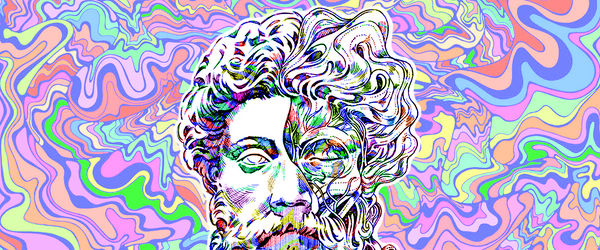StefErcolino • • 4 min read
Do You Give Money To Strangers? The Answer Might Surprise You

Subways are funny places. You’re thrown into a quaking sardine can hurtling at 70 plus miles per hours, jammed up against everyone’s sweaty, nervous bodies until someone shifts, sending the line forward and granting brief reprieve until you take your new spot on the chessboard.
That’s no special thing in itself, especially if you’ve ever been queued up in a bathroom at the old Yankee stadium. What makes the subway odd is that everyone acts as though this whole thing is something that happens to them.
The way people treat this collective experience is not as a communal event, but as something to suffer through in solitude.
You have the young man across from you, ears plugged with whatever sort of boosh boosh music he’s listening to, head capped with a snapback and clad in camo from head to toe. The snarky hipsterette to your left in an oversized sweater with a dog on it, washed out teal hair, and heart shaped glasses. Then there’s that group to your right, rambling on about whatever bullshit event/ party/ bar/ store they’re en route to just loud enough that the people around them can be awed by how rad they are. And of course, there is that crazy lady that walks up and down the middle, asking for money to go claim her dead dad’s body.
Everyone is the other, and no one is himself.
Well, maybe not that last bit exactly. That happened to me just last night and it was all I could think about this morning when I was on the train again. I wanted to give this poor woman some money, and I had it, too, yet I kept my cash in my wallet and my wallet in my pocket.
Of course, you may say “Stef, you obviously didn’t want to or else you would have.” That is not entirely true, or true at all, for to even have a choice, a true choice, one needs to have some desire for any of the possible outcomes. What it comes down to is the existential fear of negation.
Hegel notes (In Phenomenology of Spirit) that consciousness (the subject, the will, the self, the mind, the spirit, the soul, the you) desires to authenticate itself via the Other, rather, other people, or consciousnesses. It does this via products: things crafted by one consciousness, such as art, to be consumed and received by other consciousnesses. Products aren’t limited to just compositions or paintings. They could be simple actions, like giving an old woman money to claim her dead dad’s body.
Such an act is created by one consciousness and given away to be judged by the Other. Just think about what kind of looks you’d get from your fellow subway riders. The guy in front of you may just shake his head and go back to his music. The girl to your left may lock eyes and sheepishly turn away. The group may briefly shoot stares in your direction, then mumble about you in plain sight.
And of course, the sad old woman will thank you profusely and then ask the boy in the snap back for a dollar, too.
We do and don’t give for the same reason: to craft an impression for others to take as us.
If you don’t give her money, you prove that you fit in with the New Yorkers, Bostonians and Londoners with your hard exterior and harder heart. If you do give, you show how tender and thoughtful and different you are. This is your product, unwittingly mediated, put forth in the hopes that the other othernesses won’t negate your being on account of the whole validation-through-others thing.
Now I know some of you think you’re special snowflakes and don’t need other people to feel ok about who you are and that’s fine, so long as you know you’re lying to yourself. See, Heidegger (in Being and Time) notes something about authenticity:
They even hide the process by which ‘they’ have quietly relieved us of the ‘burden’ of making choices for ourselves.
It remains a complete mystery who has really done the choosing.
We are carried along by the ‘nobody’, without making any real choices, becoming ever more deeply ensnared in inauthenticity. This process can be reversed only if we explicitly bring ourselves back from our lostness in the ‘they’. But this bringing-back must have that kind of being by the neglect of which we have lost ourselves in inauthenticity.
We need to choose what we think and do and feel based on our wants and desires and knowledge, not others’. But we also need to note our desires, which, 9 times out of ten, include being accepted by the rest of society or, at least, not be overtly rejected by it. Either way, it isn’t unnatural to want the majority of people to form a positive consensus about you. And so you don’t, or do, give the woman a dollar.
You’re lucky, though. You’re in a group. You may feel as though you’re in a colony of tiny isolated universes, but you feed off each other. Poor Mersault didn’t have that in Camus’ The Stranger. He encountered the Arab, one on one, alone, isolated, solo, on a beach. Just the two of them.
You can’t pass the buck on when it’s just two consciousnesses.
There is battle, quietly roiling under the surface. There is no way for one of you to escape intact; one of you must be negated, whether by a laugh, a condescending smile, a sarcastic comment, a cold shoulder, or a bullet fired against the blistering sun. You need to ensure you are not negated, reduced, dismantled. You need to establish yourself. Your product can only be judged by one person. What if they don’t like it?
Everyone acts as though the subway is happening to them, but they are happening to the subway. Hegel also speaks of the force, a power generated via like-minded consciousness. All us subjects enter a mental social contract to suspend compassion so that we don’t need to put a bullet into each other. We authentically, if subconsciously, acknowledge that we don’t want to be negated.
All but that poor lady with the dead dad. She’s done.
In the eyes of those on that train she is less than human, nothing more than a pile of filth with a pulse. We stripped her of her subject-ness, of her projections of humanity. We don’t want to become like her. So we pretend she isn’t even there. Congratulations.


![Seneca’s Groundless Fears: 11 Stoic Principles for Overcoming Panic [Video]](/content/images/size/w600/wp-content/uploads/2020/04/seneca.png)







